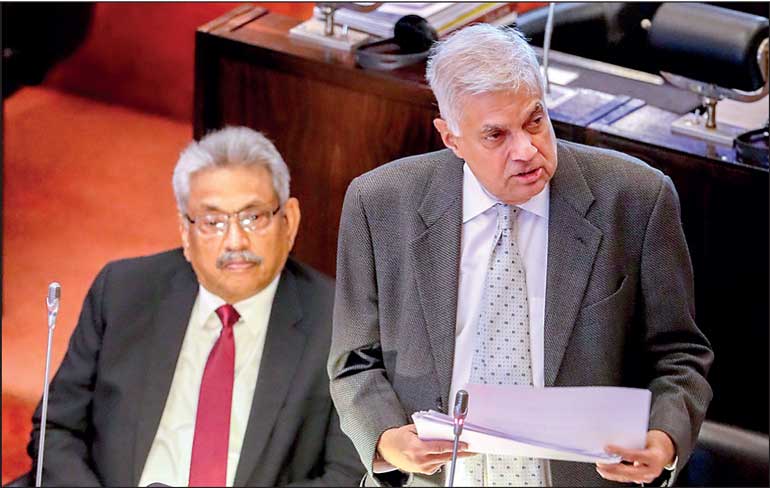Monday Feb 16, 2026
Monday Feb 16, 2026
Wednesday, 6 July 2022 00:00 - - {{hitsCtrl.values.hits}}

Prime Minister Ranil Wickremesinghe delivers his crisis resolution update in Parliament as President Rajapaksa, criticised for not stepping out of his Presidential Residence in Fort, listens intently
By Chandani Kirinde
Prime Minister Ranil Wickremesinghe told Parliament yesterday that the ongoing talks with the International Monetary Fund (IMF) is not a straightforward process, but initial discussions have ended effectively despite many difficulties.
In a statement to the House in which he outlined the roadmap to revive the economy, Wickremesinghe said unlike in the past, Sri Lanka is now participating in the negotiations with the IMF as a bankrupt country and therefore have to face a more difficult and complicated situation than in previous negotiations.
“Our country has held talks with the IMF on many occasions before. But this time the situation is different from all those previous occasions. In the past, we have held discussions as a developing country. But now the situation is different. We are now participating in the negotiations as a bankrupt country,” the Prime Minister said.
He said that after the first round of negotiations, the next step is to submit to the IMF the plan on debt restructuring and sustainability, which is being prepared by financial and legal experts Lazard and Clifford Chance. This Report is expected to be submitted by August.
“Once this is done we will be able to reach an agreement. However, even after this agreement, it must be presented to the IMF Board of Directors for approval. After approval for this plan is provided, a comprehensive loan assistance program will be prepared for a period of 4 years. We are now on that path,” he said.
“After obtaining the staff-level agreement, we will organise a donor-aid conference by bringing together the friendly countries that provide us with loan assistance, such as India, China and Japan. We hope to create a system where we can get loan assistance through a common agreement,” he said.
Wickremesinghe said the fuel and other shortages in the country have been compounded by the war in Ukraine. “Due to the recent global crises, this situation has become more acute, and we who were in the frying pan fell into the oven. Due to the Ukraine-Russia war, our problem has been made worse. What has happened now is the addition of an international crisis on top of our crisis,” he said.
Wickremesinghe said this situation is affecting other countries as well. “India and Indonesia are also affected by this global crisis. Therefore, India has had to limit the loan assistance that they have given to us. This situation affects the whole world equally. As a result of this, the United Nations Secretary General has warned that the gap between developed and under-developed countries will increase,” he said.
The Prime Minister said the roadmap has been prepared considering all the domestic and global challenges that are facing the country.
“We can refuse to change our ways. But if things do not change, the whole country will collapse. Therefore, we should strive to move forward on this path. It is not an easy journey. I have reminded you of that from time to time. This will be a difficult and bitter journey. But we can get relief at the end of this journey. Progress can be made,” he said.
The Prime Minister gave a breakdown of the debt the country has to pay in the coming months and years. “I would like to give you an idea of the debt we have to pay off so far. $ 3.4 billion between June and December this year. $ 5.8 billion in 2023. $ 4.9 billion in 2024. $ 6.2 billion in 2025. $ 4.0 billion in 2026. $ 4.3 billion in 2027. The total debt burden of the Government at the end of 2021 was Rs. 17.5 trillion and by March 2022 it has increased to Rs. 21.6 trillion. This is the real situation,” he said.
The Prime Minister said that the plan is to control inflation. “By the end of this year, inflation will rise to 60%. This is mainly due to the increase in the prices of goods in the world and the fall in the value of the rupee,” he said.
He added that due to the depreciation of the rupee has reduced the value of the money in the Employees’ Provident Fund and the Employees’ Trust Fund by 50% and the real value of pensions has also decreased by 50%.
He said the solution is to stabilise the rupee as soon as possible, strengthening the rupee without letting it fall and for this purpose, the Government has implemented a plan to limit the printing of money in the future.
“In 2023, we will have to print money with restrictions on several occasions. But by the end of 2024, it is our intention to stop printing money completely. We aim to reduce the inflation rate to between 4 and 6% by 2025,” he said.
